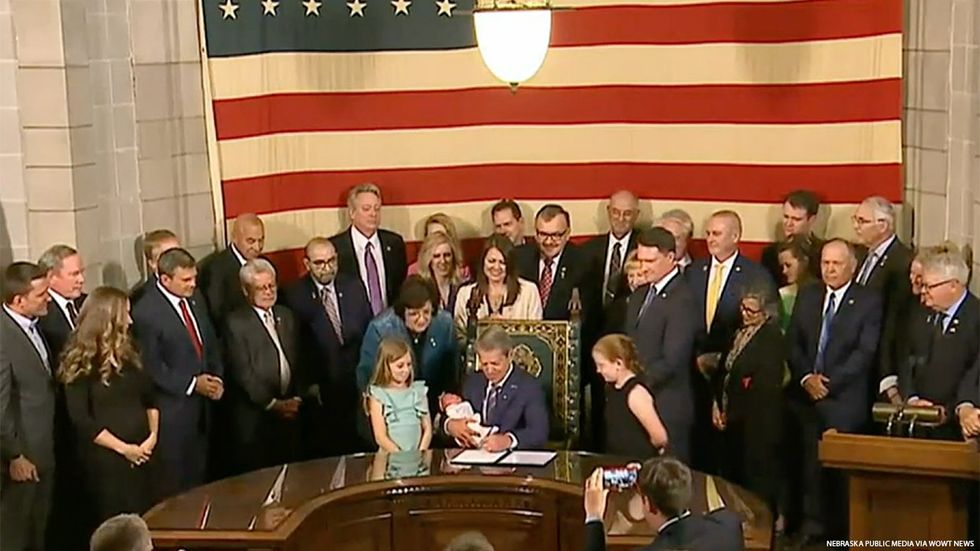Nebraska Gov. Jim Pillen has signed a bill restricting gender-affirming health care and abortion into law.
Pillen signed the bill Monday after legislators approved it last week. Lawmakers overcame a filibuster led by Sen. Machaela Cavanaugh in opposition to a ban on gender-affirming care for transgender youth. The restrictions on that care and a ban on most abortions after 12 weeks were combined into one bill, Legislative Bill 574, that the one-chamber, officially nonpartisan legislature OK’d.
“Today is an extremely historic day for the state of Nebraska,” Pillen, a Republican, said at the signing ceremony. “It’s a day where it’s really simple: We’re standing up to protect our kids so our state has a bigger and brighter future. LB 574 is the most significant win for social conservative agenda that over a generation has seen in Nebraska. I think that’s something we need to clap and shout about.” He also said the legislation was an answer to 50 years of prayers.
The ban on gender-affirming care has taken a different form from the one originally introduced, but opponents say it could still do great harm. The original bill would have banned puberty blockers, hormone treatment, and gender-confirmation surgery for anyone under 19 for the purpose of transition, although genital surgery is almost never performed on minors. The new legislation bans only surgery, both genital and otherwise, but allows Nebraska’s chief medical officer to regulate the use of puberty blockers and hormones.
That officer, Timothy Tesmer, was appointed by Pillen and has said he opposes all gender-affirming procedures for minors, so putting the power in his hands would likely result in a policy as restrictive as the one proposed in the first version of LB 574, possibly more so, according to opponents. Those already receiving nonsurgical care are exempt from new regulations.
On abortion, Nebraska previously banned the procedure after 20 weeks of pregnancy. The 12-week ban comes after legislation to prohibit it after six weeks of pregnancy failed. Abortion will still be allowed if a pregnancy results from rape or incest, or if it is life-threatening. There is no exception for fetal anomalies.
The abortion ban goes into effect with Pillen’s signature, because that part of the bill contains an emergency clause. The regulations on gender-affirming care will be effective October 1.
Sen. Megan Hunt, a bisexual woman and mother of a trans son, and Sen. John Fredrickson, a gay man, joined Cavanaugh in her filibuster of the legislation. They also created a political action committee, Don’t Legislate Hate, to support pro-equality candidates around the nation.
Sen. Kathleen Kauth, sponsor of the measure on gender-affirming care, claimed the filibuster actually helped her cause. “Had they not filibustered, this bill would have been dead in February because these are three- to five-year issues,” she said at the signing ceremony. “This would have been something I worked on over the interim and brought back. But … the filibuster gave us the time to talk to each other, the time to get more experts to talk to each other, the time to have more testimonies.”
She contended that gender transition is a result of “social contagion.” “We have too many kids who are being swept up in what is a social contagion and being told their bodies are not perfect the way they are and if they just switch their gender, they’ll be fine. Everything will be great,” she said. “That’s not true. Our kids need help. They need to know they’re perfect exactly the way they are, not the way they think they should be.”
Civil rights activists denounced the newly signed law. “We are devastated about the cruel and harmful bans signed into law today,” Ruth Richardson, president and CEO of Planned Parenthood North Central States, said in a press release. “We will do everything we can to help patients in Nebraska. We will continue offering abortion as allowed in the new law, and we will help patients get connected to the help they need to get to appointments out of state. We are working every day to provide people the health care they need. Politicians have made our work unnecessarily harder, but our doors are open and we’ll keep doing everything we can for patients and communities.”
“We know that health care restrictions uniquely impact marginalized communities most,” Richardson added. “People of color, people with low incomes, the LGBTQIA+ community, people with disabilities, and people in rural areas face more barriers to health care. We will keep working to shrink health inequities and expand health care to all. Every person deserves the freedom to control their lives, bodies, and futures.”
The Human Rights Campaign called the new law “a super-sized attack” on health care. “Today, Governor Pillen ignored the pleas of pro-equality legislators, transgender youth, and other marginalized people in his state,” said a statement from HRC State Legislative Director and Senior Counsel Cathryn Oakley. “By enacting the ‘Let Them Grow Act’ —- a painfully ironic title — transgender and nonbinary children in Nebraska will now find it even more difficult to grow up as their healthy, authentic selves. Age-appropriate, medically necessary gender affirming care is lifesaving health care. Period. The governor’s decision to also sign a 12-week abortion ban into law further places him at odds with the will of Americans and most Nebraskans. Instead of serving in the best interest of his constituents, Governor Pillen is clearly more concerned with fulfilling an extreme, out of step, ideological agenda to score cheap political points from the far fringes of his base. Placing a target on equal access to lifesaving health care is reprehensible, and we condemn the governor for his failure to do the right thing.”
“The governor’s decision to sign these sweeping restrictions into law betrays a total disregard for Nebraskans’ freedom, health and well-being,” added Mindy Rush Chipman, interim executive director of the American Civil Liberties Union of Nebraska. “Just as we have seen in other states, these bans will result in significant harm, most intensely hurting already vulnerable communities. Remember that more than 1,000 local medical professionals warned senators that LB 574 would put lives at risk — officials should have listened. Every option is on the table to undo these regressive measures, including seeking justice through the courts. We will not stop working toward a future that safeguards all Nebraskans’ rights, including the rights of transgender youth, their families and people in need of reproductive health care.”
Other states that have outlawed some or all gender-affirming care for trans minors through legislation are Alabama, Arizona, Arkansas, Florida, Georgia, Idaho, Indiana, Iowa, Kentucky, Mississippi, Montana, North Dakota, Oklahoma, South Dakota, Tennessee, Utah, and West Virginia. The Alabama, Arkansas, and Oklahoma bans are temporarily blocked from enforcement while lawsuits are heard. Bans are awaiting governors' signatures in Missouri and Texas.


















































































